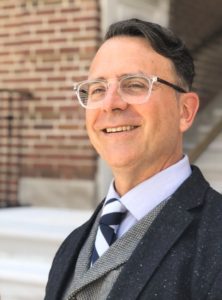Bona Verba from the Headmaster
As Cincinnati Classical Academy expands into the high school grades, a wave of expectations has begun to build—loud, insistent, and often impatient. Parents, students, teachers, and onlookers alike voice their desires: We want sports—every sport imaginable—and we want them now. We want clubs—every conceivable club. Fencing, robotics, computer gaming, a Norwegian woodcarving guild for that one kid who spent a summer whittling pine branches in northern Michigan. And we want them now. This mindset—a culture of wanting everything immediately—risks overshadowing the thoughtful, well-planned growth of the school. It misses the virtue of gratitude and dismisses the necessity of prudence. True excellence, after all, does not come from rushing to meet every demand; it is built slowly, intentionally, with patience and care.
At moments, it all feels like a Kafkaesque parody—an assembly of voices that speak louder than they listen, louder still than they understand. For growth of the sort that Cincinnati Classical Academy undertakes is not a matter of conjuration, of wands waved or shortcuts taken. It is, rather, the painstaking business of prudence—brick by brick, line upon line, like the curriculum itself, a thing measured, cultivated, and wrought by hands that understand the gravity of the task. It is the sober refusal of haste in favor of harmony, of excess in favor of excellence.
But such restraint—such calculated patience—seldom satisfies the We want chorus, whose members stand, arms crossed, examining the unfolding design and whispering their certainty that something is missing. And the whispers—here is where it gets tricky—begin to propagate into rumors, into assumptions, baseless yet loud, as if noise alone could solidify the fiction. Are we sure they know what they’re doing? Why don’t we have everything already? Doesn’t every great school have it all?
It is here that the crux of the matter emerges, tangled somewhere between society’s largesse and its entitlement, the unshakable delusion that excellence can simply happen. That it is a birthright, a default setting rather than a hard-earned crown forged through time, sacrifice, and resources. There is a kind of tragic blindness in all this—an inability to see that too much, too soon, is not abundance but disarray. For what happens when every sport, every club, every shiny, crowd-sourced desire is offered at once? We scatter. We spread ourselves so thin that mediocrity becomes inevitable, excellence impossible.
Consider the great cultures of the world, the lasting ones. Were they built through clamoring? Through demands shouted louder than the voice of the mission itself? Or were they the fruit of vision, of trust—trust in leaders to plant seeds and let them grow in their season? Unfortunately, this Cult of Now confuses speed for progress, democracy for wisdom. Yet culture—true culture, the kind worth stewarding—cannot be crowd-sourced. It cannot be voted into existence. It must be cultivated. It must be guarded.
And so, it falls to us—to Cincinnati Classical Academy, its leaders, its parents, its mission—to hold the line. To silence, gently but firmly, the murmurs of entitlement and impatience, and to remind all who care to listen that excellence is not accidental. It is the child of prudence and discipline, of small victories earned one season at a time. It is the slow, methodical fulfillment of a vision laid long before the noise began.
We must be grateful for this growth, not resentful for what is not yet here. For in time, if we trust the plan, if we resist this Cult of Now, all things—academic, artistic, athletic—will flourish in their fullness. The voices of demand will fade. The murmurs will cease. And what will remain is something far better than the haphazard collection of desires met: a school, a culture, a legacy that endures.
Torches Up!
Mr. Michael Rose
Headmaster

Mr. Michael Rose
Meet the Headmaster
Mr. Rose has taught various courses at Brown University, Cincinnati Moeller, and The Summit Country Day School. As a part of his degree work in education, Mr. Rose’s research interests included the Great Books curriculum, the Paideia teaching method, and the “effects of emerging digital technology on student reading, writing, and researching.” Read More

